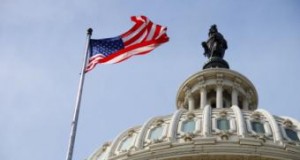Three industry analysts gave testimony before a Senate committee on housing finance reform Tuesday. While all three experts expressed support for more private capital and less government involvement, the proposed degrees of government support varied. Currently, about 90 percent of single-family mortgages have some form of government backing.
Read More »QM Critics: Mortgage Rule to Set Up Another Meltdown
Two fellows at the American Enterprise Institute (AEI) assert that the QM rule is "simply another and more direct way for the government to keep mortgage underwriting standards low."
Read More »House Committee Holds Hearing on FHA’s Viability
The House Financial Services Committee assembled to hear from experts on the the Federal Housing Administration's (FHA) current financial situation.
Read More »AEI Report Calls Out FHA’s ‘Abusive Lending Practices’
A study from the American Enterprise Institute (AEI) asserts the Federal Housing Administration (FHA) is inadvertently setting the country up for another housing collapse. In a report titled How the FHA Hurts Working-Class Families and Communities, AEI resident fellow and former Fannie Mae EVP Edward Pinto says an analysis of FHA's books for fiscal years 2009 and 2010 show the agency's "lending practices are inconsistent with its mission and represent a disservice to American working-class families and communities."
Read More »Experts: GSE Reform Unlikely Until After 2012 Election
Fannie Mae and Freddie Mac entered federal conservatorship in 2008, as lawmakers and presidents stepped in to stymie a freefall for the nation├â┬ó├óÔÇÜ┬¼├óÔÇ×┬ós largest mortgage companies, just as words like subprime and systemically important institutions gained traction for the public. Four years and roughly $180 billion in taxpayer funds later, old hands, regulators, and freshman lawmakers alike struggle with a vexing riddle. How can a system polarized by politics safely shrink companies responsible for more than $11 trillion in mortgages without blowing the recovery ├â┬ó├óÔÇÜ┬¼├óÔé¼┼ô and what will it mean for mortgage finance?
Read More »FHA May Soon Need $50B in Bailout Funds: Study
The GSEs remain a mainstay in debates over the role of the government in housing, but some now say the Federal Housing Administration may take a turn as the next agency in need of bailout funds. A new study by Joseph Gyourko, a University of Pennsylvania real estate and finance professor, highlights future peril for the agency, predicting that it may need as much as $50 billion in federal funds over the next several years just to stay solvent. Some analysts say the real threat is not from a bailout but from sapped liquidity and credit for homeowners.
Read More »Senator Proposes Bill to Wean GSEs Off Federal Funds
Fielding more pressure for housing finance reform, Sen. Bob Corker (R-Tennessee) introduced a bill Wednesday that aims to decouple government assistance from the GSEs and shore up private-sector involvement in mortgage markets. The bill, titled the Residential Mortgage Market and Privatization Act, proposes gradually reducing the percentage of principal in the GSEs├â┬ó├óÔÇÜ┬¼├óÔÇ×┬ó mortgage-backed securities, streamlining underwriting standards and origination databases, and removing federal guarantees to create a much-discussed to-be-announced market.
Read More »Policymakers See GSE-Free Future as Freddie Asks for $6B
The head of the agency that regulates the GSEs addressed one lawmaker's recent proposal to eliminate the federal lifeline for Fannie Mae and Freddie Mac Thursday even as the latter filed staggering third-quarter losses and requested another $6 billion in taxpayer funds. Federal Housing Finance Agency Acting Director Edward DeMarco and several others testified before the House Subcommittee on Capital Markets, which heard the chief regulator describe why the federal government needs to slowly phase out taxpayer support for the GSEs.
Read More »Economists: Fed Buy-Up Will Do Little for Housing
Federal Reserve Chairman Ben Bernanke again made waves Wednesday with an announcement that the central bank plans to sell $400 billion in short-term Treasuries to keep a heel on still-low interest rates and offset widespread fears that the U.S. economy may soon enter a downturn. The move follows successive efforts from the Fed, which more recently pledged to keep interest rates low until 2013. Speaking with MReport, economists largely panned the effort.
Read More »Latest Suit Adds to MBS Woes for JPMorgan Chase
In another twist for the nation's largest mortgage lenders, Wells Fargo upped the ante against JPMorgan Chase & Co. by filing a suit in a Delaware court to order the latter to buy back over $558 million in bad mortgage-backed securities. Multiple news outlets offered up the latest tizzy Thursday, with Wells escalating the case after JPMorgan refused to budge on the repurchases. The loans stem from the Bear Stearns Mortgage Funding Trust 2007-AR2, otherwise known as the EMC unit, which JPMorgan acquired in 2008.
Read More » theMReport.com Your trusted source for mortgage banking news
theMReport.com Your trusted source for mortgage banking news









